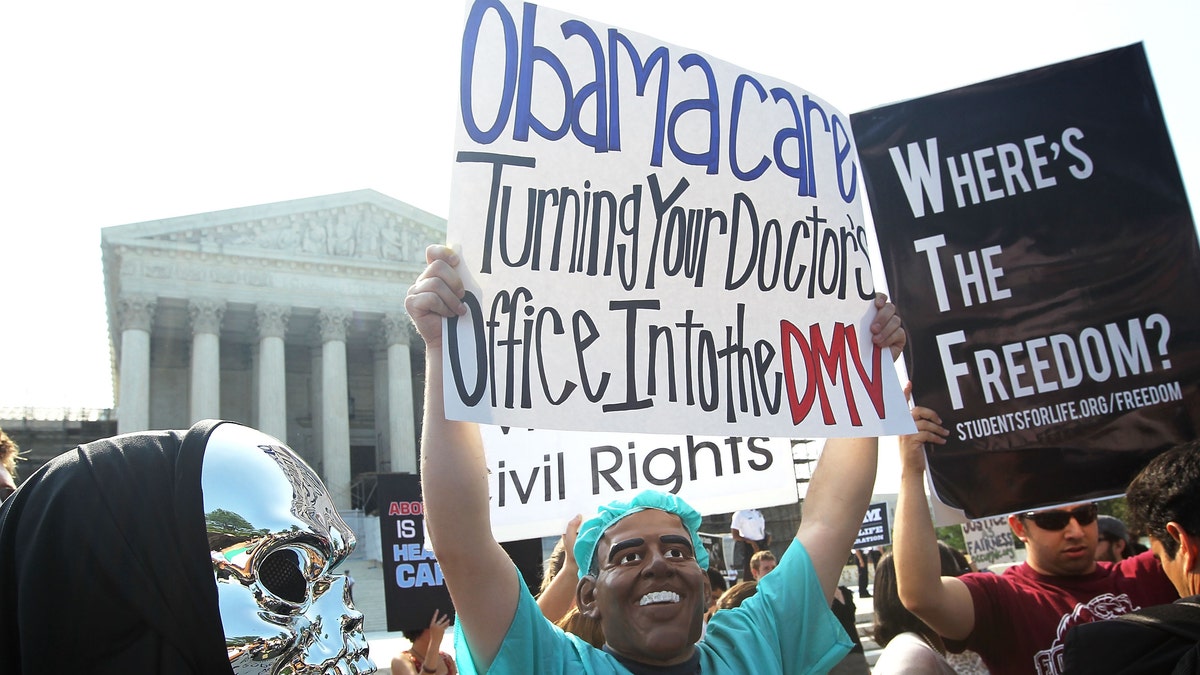
WASHINGTON, DC - JUNE 28: Anti-Obamacare protesters wear masks of U.S. President Barack Obama and Grim Reaper as they demonstrate in front of the U.S. Supreme Court June 28, 2012 in Washington, DC. The Supreme Court is expected to hand down its ruling on the Affordable Healthcare Act this morning. (Photo by Alex Wong/Getty Images) (2012 Getty Images)
As Independence Day approaches, we reflect upon the blessings afforded to us by this great country of ours. America is indeed the land of the free and of opportunity, where the rights to life, liberty, and the pursuit of happiness are unalienable.
These rights are also the noble ideals upon which this great nation was founded. As such, they lie at the very heart of the ongoing national debate about how to best reform our health care system.
The Supreme Court’s ruling upholding ObamaCare hurts Hispanics and all Americans especially hard during one of the worst economic times in our country’s history. The Court’s ruling sheds light on the truth – the Obama Administration is permitted to impose a tax on millions of uninsured Americans on top of the Affordable Care Act’s already-massive burden on the middle class.
Simply because something is deemed constitutional, it doesn’t mean it is good policy.
A federal mandate is not what the American people need or want to improve our health care system.
As it stands, this law endangers quality private coverage for families; it puts the financial security of countless Hispanic families at risk; and irresponsibly places the burden of debt on our children and grandchildren - jeopardizing the American dream.
The burden now lies on Congress to work in a bipartisan manner to replace key provisions of ObamaCare with reforms that truly increase access to quality and affordable healthcare, while protecting future generations from a mountain of debt.
Reforming healthcare to make the system work better is imperative, in particular for Hispanics. At 34 percent, Latinos have the highest uninsured rate among all ethnic groups. A shortage of providers, financial constraints, cultural and language barriers, and a lack of preventative care are serious threats to the well-being of our Hispanic community at large. Unfortunately, ObamaCare is not the prescription for what ails us when it comes to healthcare in America.
ObamaCare is unprecedented in its scope and mandates. It forces Americans to buy a commercial product that they may not want, need, or afford, or as confirmed by the Supreme Court, face a tax if they don’t. The law also grants the federal government aggressive and over-reaching power over patients, doctors and the decisions they should make together, in private, without Big Brother’s influence in arguably one of the most personal and confidential aspects of our lives.
Other key features of this law should also raise red flags for all of us. Supporters of ObamaCare promised it would cut costs, allow people to keep the coverage they have, shore up Medicare, and still reduce the deficit. Sounds too good to be true? That is because it is too good to be true.
To pay for a portion of the new programs, the law cuts more than $500 billion from an already cash-strapped Medicare, upon which millions of Americans rely for care. At the same time, it threatens the good private coverage that millions upon millions of Americans currently have, and forces others into state-run exchanges.
Then there is the legacy of debt and deficit the law puts on the shoulders of our children and grandchildren--more than a trillion dollars in new spending piled on top of the crushing $16 trillion we are already facing.
Studies show that premiums for an average American family have risen $1,200 since three of the law's requirements took effect, an increase of nearly 10 percent. Earlier this year, Gallup reported that more American adults lacked insurance coverage in 2011, even after ObamaCare was in place, than in 2008.
Improving access to and affordability of health care is something the vast majority of Americans support. Yet, national poll after national poll also shows the vast majority of people have serious concerns about several provisions of ObamaCare and the process by which it became the law of the land.
The best way forward--for Latinos and everyone else-- is to rely on a common sense approach and take small, but meaningful steps towards real reform of our healthcare system. In 2009, Americans wanted to reform our healthcare system, but they wanted a reform that lowered costs, increased the quality of care and increased their insurance options. Relying on the government to tell us what to do, when to do it, and how to do it, is not the answer; and it is certainly not the American way.




